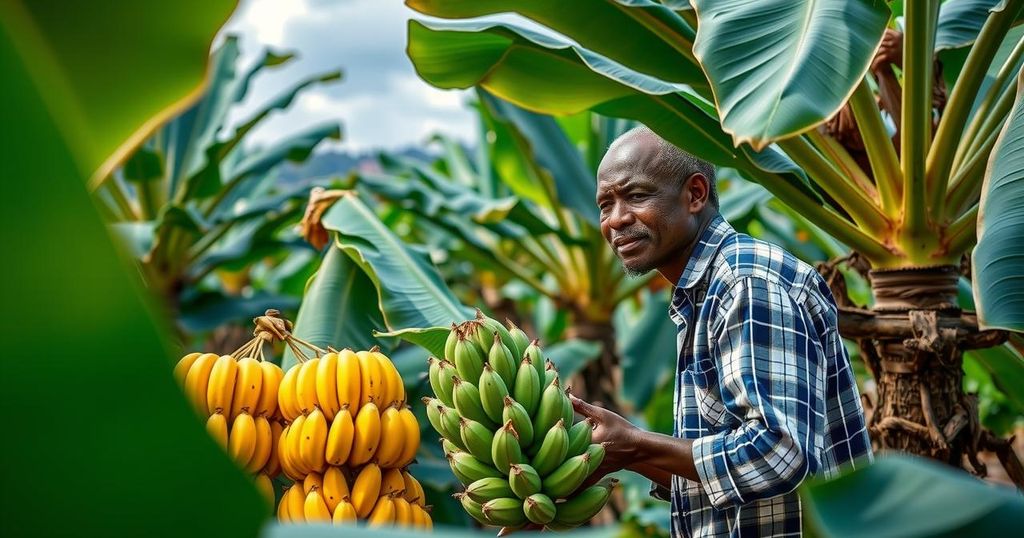Ahumwire Justine, a banana farmer from Shuku, Uganda, faced severe losses due to climate-induced weather events, prompting the introduction of a novel insurance model aimed at protecting farmers from extreme weather. The NDC Action Project collaborates with local organizations to educate farmers on digital platforms for insurance claims and improve agricultural practices, thereby enhancing their resilience and productivity. This initiative not only offers financial security but also promotes sustainable agricultural practices, addressing the urgent need for adaptation in the face of climate change.
Ahumwire Justine, a banana farmer from Shuku in southwestern Uganda, exemplifies the increasing vulnerability faced by agricultural workers due to extreme weather events. In October, a devastating rain and hailstorm decimated 300 of her banana trees and resulted in the loss of two cows. This calamity left her family contemplating leaving their uninsured two-hectare plot, faced with a dire lack of food and funds for their children’s education. The Intergovernmental Panel on Climate Change reports that incidents of severe storms, such as the one that impacted Justine’s crops, are becoming more frequent and intense due to climate change. To address these challenges, the NDC Action Project—an initiative by the United Nations Environment Programme (UNEP) and UNEP Copenhagen Climate Centre (UNEP-CCC)—aims to equip farmers like Justine with necessary protective measures against escalating extreme weather. “We know farmers, particularly smallholders, are struggling to adapt to the effects of the climate crisis,” states Mirey Atallah, Chief of the Adaptation and Resilience Branch within UNEP’s Climate Change Division. The program focuses on combining technical and financial support, thereby enhancing farmers’ resilience against climate impacts. Bananas are crucial to Uganda’s economy, with approximately 47 percent of farmers engaged in their cultivation as of 2019. Beyond serving as a food source, bananas contribute to the production of ropes and packaging materials derived from the plant’s fibers and leaves. However, due to the unpredictable weather patterns exacerbated by climate change, many farmers face significant challenges. Florence Muranga, Director of the Banana Industrial Research and Development Centre, emphasizes the perilous situation: “[Farmers] can lose their food, their livelihood, their house in one day.” The Banana Industrial Research and Development Centre, representing 5,000 banana farmers, has played a key role in enhancing access to crop insurance through training programs involving the use of smartphones. Farmers learned to upload images of their healthy crops onto a digital platform. Following a storm, they documented the damage online, allowing agroeconomists to assess and quantify the losses. A significant portion of these farmers, nearly 50 percent, are women, highlighting the inclusive approach of the training. Previous experience with smartphones was not a hindrance; designated ‘Champion farmers’ trained their peers in utilizing this technology. Collaboration with Agriculture and Climate Risk Enterprise Africa allows smallholder farmers to connect with insurance providers. The insurance is facilitated by Agro Consortium Limited, a partnership of 13 insurance companies. The digital platform minimizes the need for in-person assessments, accelerating claims processing and lowering costs. In addition to insurance, farmers received training in water management and agroforestry practices, increasing productivity and reducing climate-related losses significantly. As this pilot project has demonstrated success, plans are underway to expand the program to encompass all 5,000 farmers represented by the centre, with aspirations to include 50,000 banana farmers nationwide. For Justine, the availability of insurance offers invaluable reassurance, stating, “I know that if [my crops get damaged] I have help. It is not like in other years, where I would have to start from zero.” The overarching goal of UNEP aligns with the Paris Agreement to control global temperature rise to well below 2°C, targeting 1.5°C compared to pre-industrial levels. This commitment is encapsulated within the Sectoral Solution framework, which outlines a strategic approach for emission reductions across vital sectors including agriculture, energy, and land use, aiming for comprehensive climate stability.
The increasing frequency and severity of extreme weather events, particularly in agricultural sectors, poses significant risks to farmers worldwide. In Uganda, banana farming is not only vital for food security but also critical to the nation’s economy, employing a large proportion of the population. Climate change exacerbates weather unpredictability, resulting in farmers experiencing cycles of both prolonged droughts and intense rainfall, leading to crop losses and economic hardship. Recent initiatives focus on providing farmers with tools such as insurance to mitigate these risks, facilitating their adaptation to climate change impacts and securing their livelihoods.
The implementation of innovative insurance solutions has the potential to transform the agricultural landscape for banana farmers in Uganda by providing necessary financial security against climate-related disasters. With the support of the NDC Action Project and training initiatives, farmers are better equipped to manage their resources and weather the uncertainties posed by climate change. By expanding access to these resources, the initiative not only bolsters individual farmer resilience but also contributes to the broader agricultural economy, emphasizing the necessity of proactive measures in addressing the ensuing challenges of a changing climate.
Original Source: www.unenvironment.org







